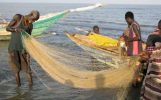The Intergovernmental Authority on Development (IGAD) is set organized a two days meeting in Addis Ababa, Ethiopia to discuss on a regional fisheries and aquaculture strategy (RFAS) for 2016-2020 it has developed. Experts in fisheries from IGAD member states: Djibouti, Ethiopia, Kenya, Somalia, South Sudan, Sudan and Uganda are expected to reflect on the strategy.
The experts will reflect on the strategy developed with the financial assistance from the European Union and its implementations for the coming two days.
The strategy provides a clear road map for the intervention to be undertaken in the area of fisheries and aquaculture, based on the Vision and the Strategic Papers of IGAD and other relevant documents that guide IGAD intervention within the region.
It also offers an opportunity to the Member States and IGAD to utilize the fish resource sustainably in the region especially in ASAL to combat food in-security, malnutrition and also to build resilience. The strategy will help to mobilize resources from national governments, development partners, private sector and other interested parties, according to IGAD.
In addition representatives from the African Union, the New Partnership for Africa’s Development (NEPAD) and from regional economic communities such as the Common Market for Eastern and Southern Africa (COMESA), the East African Community (EAC) are expected to attend.
Reports show that illegal fishing is taking place in the IGAD Region where fishers and vessels are harvesting fish in violation of the laws of fisheries under the jurisdiction of coastal states. Fisheries and aquaculture can play an essential role in fighting under-nutrition and poor nutrition as fish contributes directly to the diet of populations in developing countries.
Sustainable fisheries and aquaculture can contribute to economic growth in developing countries. According to EU fisheries represent one of the most traded food commodities, with a share of about 40% of total fishery and aquaculture production entering international trade and a yearly export value of more than $130 billion.
While some of the IGAD members have not been utilizing their fishery potential others, such as, Somalia have failed to combat illegal fishing done by foreigners.
Fish, which is one of the sources of protein, accounts for about 17% of the global population’s intake of animal protein. In West Africa, Asian coastal countries and many small island states, the proportion of total dietary protein from fish can reach 60% or more.

